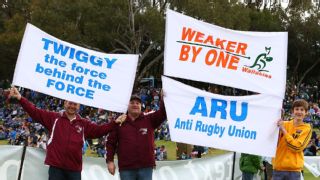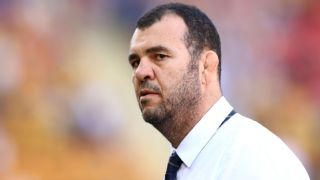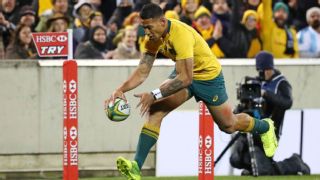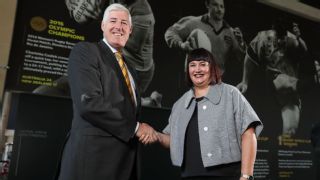|
Australia not so super anymore Fans endured the most miserable season in Super Rugby history, with Australian teams not only losing all 26 clashes with New Zealand opposition, but losing an entire franchise in the embarrassingly drawn-out downsizing saga.  It remains to be seen if the painful and protracted culling process of the Western Force, which stained the domestic rugby scene in 2017 and leaves Australia with only east coast representation, will fix the problems besetting Super Rugby after two utterly forgettable years. Mining magnate Andrew Forrest's ambitious Indo Pacific Rugby Championship, to launch in 2019, appears the only hope for the alienated WA rugby market to remain interested. Wallabies coach's reality Cheika A drought-breaking victory over the world champion All Blacks amid a seven-match unbeaten run was the highlight of an otherwise inconsistent international season that has left Wallabies coach Michael Cheika under pressure to deliver genuine hope in 2018.  Losses home and away to Scotland, including a record-setting season-ending 53-24 defeat in Edinburgh, has left Cheika with a 53 per cent success rate since taking over from Ewen McKenzie in late 2014. McKenzie (50 per cent) is the only Australian coach in the 21-year professional era with a worse return. And after a fifth straight loss to Eddie Jones' England, a series victory over Ireland next year and another strong showing against New Zealand in the Rugby Championship will be crucial in filling fans with optimism ahead of the 2019 World Cup in Japan. Three big reasons to believe After a barren 11-Test run, Israel Folau put his try-scoring drought behind him in a spectacular record-setting year. The superstar fullback earned an unprecedented third John Eales Medal and a world player of the year nomination after breaking Lote Tuqiri's record for most tries in a calendar year with 12 five-pointers in 10 Tests.  Throw in the return of midfield maestro Kurtley Beale from a year-long spell in the English Premiership and the impending comeback of champion back-rower David Pocock from his studying sabbatical to work in tandem with world-class loose forward Michael Hooper and the Wallabies should only improve in 2018. Cheika introduced another 14 players to the Test arena this year, with winger Marika Koroibete, utility back Karmichael Hunt, back-rower jack Dempsey and lock Izack Rodda the most impressive. Queen of the Castle Former Canterbury NRL and Netball New Zealand boss Raelene Castle is promising to reconnect disillusioned fans after becoming Rugby Australia's first female chief executive. Citing her experience with the Bulldogs' "strong personality" coach Des Hasler, Castle is also vowing to forge a successful working relationship with Cheika, with no backward steps.  The proud Kiwi is also pledging to is work closely with the states to reunite Australian rugby and, most importantly, trade her All Blacks scarf for the Wallabies gold. New look and plans Apart from Castle's historic appointment, the Australian Rugby Union morphed into Rugby Australia and opened a swish new modern headquarters in Sydney's Moore Park sporting hub to go with their new brand. RA revealed plans to establish a national coaching and advisory panel and recruited respected analyst and broadcaster and former Wallaby Rod Kafer to coordinate it and work within their high-performance department. The need to develop more elite home-grown coaches was obvious given the shortage of locally-born potential successors to Cheika, apart from his assistant and former Brumbies boss Stephen Larkham. The new Brumbies mentor Dan McKellar is the only Australian-born coach at the four remaining Super Rugby franchises. No sevens heaven Australia's women couldn't reproduce the consistency that won them an Olympic gold medal and the 2015-16 World Series, dropping back to second in the rankings. The men also slipped from fourth to sixth in their World Series. The Wallaroos briefly earned some much-needed attention for the women's 15-a-side game, but couldn't achieve their aim of making the semi-finals and had to settle for sixth at the World Cup after winning three of their five games. The introduction of the Super W, a six-week competition in 2018, has been hailed as another big step forward for women's rugby.
|
